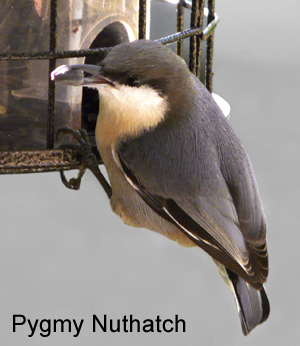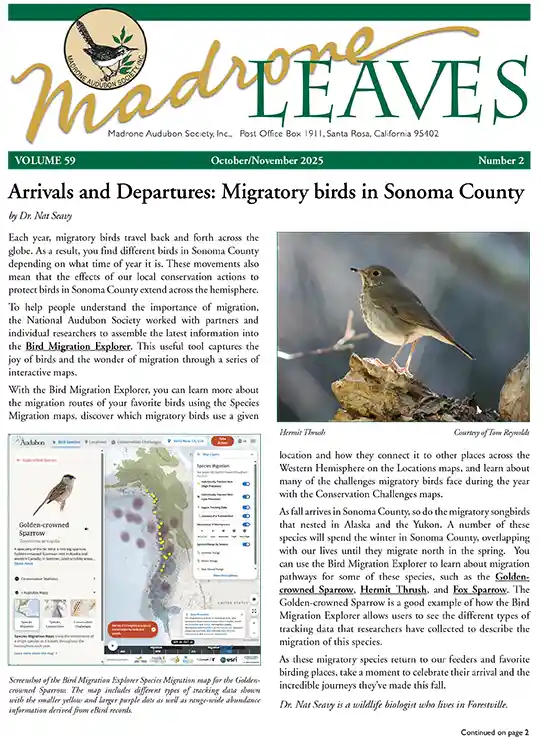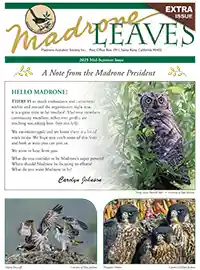Bird Feeding Guidelines
Bird Feeding Guidelines

Please take the following preventative measures if you host bird feeders or bird baths in your backyard. These measures should be practiced as regularly scheduled maintenance to ensure healthy birds:
- Birdfeeders should be disinfected every two weeks regardless of disease outbreaks.
- Birdbaths should be emptied and cleaned daily regardless of disease outbreaks.
- For feeders: Immerse feeders in 1:32 bleach solution (1 part bleach, 32 parts water) Soak 10 minutes, scrub, rinse thoroughly and allow to dry fully before refilling (a dry feeder will deter mold growth on seeds). Do not use wood feeders.
- For baths: You can make a 1:32 bleach solution in a jug to bring outside. Scrub with a hard brush and soak for 10 to 20 minutes. Cover the bath with a board while soaking to prevent birds bathing in bleach, rinse very thoroughly, allow to dry before refilling.
If you have sick birds visiting your feeder or have found birds in your yard that have died from a disease outbreak:
- Immediately REMOVE bird feeders and birdbaths.
- Disinfect feeders and baths as described above.
- Do not rehang feeders or birdbaths for at least one month after the last sick or dead bird is seen in your yard.
Additional tips:
- Wear gloves to prevent skin contact with bleach.
- Wear a mask to prevent the accidental ingestion of fecal matter while cleaning feeders.
- Wash your hands thoroughly with soap and water after contact with a sick bird or birdfeeder.
Salmonella Outbreak among Songbirds in Sonoma County
We are experiencing a Salmonella outbreak among songbirds in Sonoma County this winter. Birds most commonly affected by Salmonellosis are Pine Siskins and Goldfinches. Both are small yellow and brown-yellow finches that frequent backyard bird feeding stations. Typical signs of illness are lethargy, puffy or fluffed up appearance, and occasionally swollen/irritated eyes.
Bird feeding stations are an enjoyable pastime for humans. We are able to watch beautiful birds up close and observe their behavior. However, feeding stations create an unnatural concentration of wildlife that becomes vulnerable to the spread of various diseases such as Avian Pox, Conjunctivitis as well as Salmonella. Pine Siskins are especially susceptible to Salmonella and are quickly infected with the bacteria when they visit feeding stations.
Please help reduce the spread of disease. Salmonellosis can be deadly to birds and spreads rapidly through songbird populations. An epidemic can start when birds feed together at bird feeders, or when they use improperly-cleaned birdbaths. Fecal matter from infected birds contaminates food and water sources. If you observe sick birds at your feeder, the best thing to do for the birds is to take the feeder down for a few weeks. Our native birds have co-evolved with their natural food sources, so they will not go hungry if you remove your feeder. Healthy birds will disperse and find natural food sources elsewhere.
Reprinted from Swallow Tales, the Native Songbird Care and Conservation newsletter, Winter 2012-13 with permission from Veronica Bowers
To read the February 2015 Press Democrat article on the Salmonella Outbreak click here.
Find us on Facebook 
It's Nesting Season: trim trees in the Fall!.
Amazon Smile: donate to Madrone when you shop
Birding Quiz - test your skills.
Leaves Newsletter


Carved Bird Pins
In the 1970s, member Tom Olds hand-carved bird pins and sold them to raise money for Madrone Audubon. More